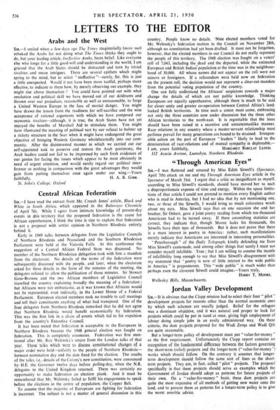Central African Federation
SIR,--I have read the extract from Mr. Creech Jones' article, Black and White in South Africa, which appeared in the Bulawayo Chronicle of April 7th. While I agree from intimate knowledge of present-day events in this territory that the proposed federation is the cause for African apprehension, I think the time is ripe to explain that federation is not a proposal with settler opinion in Northern Rhodesia entirely behind it.
Early in 1949 talks between delegates from the Legislative Councils of Northern Rhodesia and Nyasaland and the Southern Rhodesian Parliament were held at the Victoria Falls. At this conference the suggestion of a Central• African Federal State was discussed. No member of the Northern Rhodesian delegation took with him a mandate from the electorate. No details of the terms of the federation were subsequently discussed with the people, and later, when the electorate asked for these details in the form of the minutes of the meeting, the delegates refused to allow the publication of those minutes. Sir Stewart Gore-Browne and the two African members of Legislative Council travelled the country explaining broadly the meaning of a federation ; but Africans were not enthusiastic, as it was known that Africans would not be represented, even indirectly, in the Lower House of a Federal Parliament. European elected members took no trouble to call meetings and tell their constituents anything of what had transpired. One of the four delegates from Northern Rhodesia remarked that he did not agree that Northern Rhodesia would benefit economically by federation. This was the first link in a chain of events which led to his expulsion from the country's Executive Council.
It has been stated that federation is acceptable to the Europeans in Northern Rhodesia because the 1948 general election was fought on federation. This is completely erroneous. Federation was first men- tioned after Mr. Roy Welensky's return from the London talks of that year. Those talks which were to discuss constitutional changes of a major order were held—unfairly to the people of Northern Rhodesia— between nomination day and the date fixed for the election. The results of the talks, i.e., details of the Colony's new constitution, were announced by H.E. the Governor twelve days before polling-day, when the N.R. delegates to the United Kingdom returned. There was certainly no opportunity to make federation an election plank. And it must be remembered that Mr. Welensky failed to fulfil his engagements to speak before the elections in the centre of population, the Copper Belt.
To assume that the majority of Europeans are fighting for federation is incorrect. The subject is not a matter of general discussion in this
country. People know no details. Nine elected members voted for Mr. Welensky's federation motion in the Council on November 28th, although no constitution had yet been drafted. It must not be forgotten, however, that the elected members in our Council do not really represent the people of this territory. The 1948 election was fought on a voters' roll of 7,043, including the dead and the &parted, while the estimated European and British Indian population at the time was in the neighbour- hood of 30,000. All whose names did not appear on the roll were not minors or foreigners. If a referendum were held now on federation on the present roll, the decision would not represent a clear-cut mandate from the potential voting population of the country.
One can fully understand the Africans' suspicions towards a major change the details of which are not public knowledge. Thinking Europeans are equally apprehensive, although there is much to be said for closer unity and greater co-operation between Central Africa's la* locked British territories. In time such a union must come, embracing not only the three countries now under discussion but the three other African territories to the north-east. It is regrettable that the issue should have been raised in a secretive and unstatesmanlike manner. Race relations in any country where a master-servant relationship must perforce prevail for many generations are bound to be strained. Irrespon- sible action on the part of European " leaders " likely to lead to the deterioration of race-relations and of mutual sympathy is deplorable.-






































 Previous page
Previous page